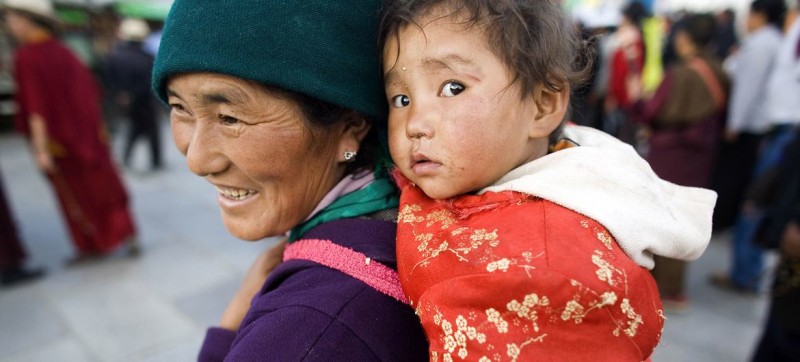© UNICEF/Palani Mohan A woman carries a child in Barkhor, in the Tibet Autonomous Region. (file)
“We are very disturbed that in recent years the residential school system for Tibetan children appears to act as a mandatory large-scale programme intended to assimilate Tibetans into majority Han culture, contrary to international human rights standards,” they said in a statement.
Erosion of identity
Tweet URL
Residential schools provide educational content and an environment centred around Han culture, according to the independent experts: Fernand de Varennes, Special Rapporteur on minority issues; Farida Shaheed, Special Rapporteur on the right to education, and Alexandra Xanthaki, Special Rapporteur in the field of cultural rights.
They said children from the Tibetan minority are forced to complete a “compulsory education” curriculum in the Mandarin Chinese language, or Putonghua, with no access to traditional or culturally-relevant learning.
Government schools also do not provide for substantive study of Tibetan language, history and culture.
“As a result, Tibetan children are losing their facility with their native language and the ability to communicate easily with their parents and grandparents in the Tibetan language, which contributes to their assimilation and erosion of their identity,” they added.
School numbers increasing
The experts also were concerned about a reported substantial increase in the number of residential schools operating in and outside of the Tibet Autonomous Region, and the number of Tibetan children living in them.
While residential schools exist in other parts of China, their share in areas with Tibetan minority populations is much higher, and this percentage has been increasing in recent years.
Nationally, the percentage of students boarding is more than 20 per cent, but the experts said information they received, points to the vast majority of Tibetan children being in these institutions, nearly one million.
Far from home
The increase has been achieved through closing rural schools in areas that tend to be populated by Tibetans, replacing them with township or county-level schools where teaching and communications are almost exclusively in Putonghua (standard Mandarin), and students are usually required to board.
“Many residential schools are situated far from the family homes of students boarding in them,” the experts continued.
“We are alarmed by what appears to be a policy of forced assimilation of the Tibetan identity into the dominant Han-Chinese majority, through a series of oppressive actions against Tibetan educational, religious and linguistic institutions,” they added.
Suppression and persecution
These policies run contrary to the prohibition of discrimination and the rights of the Tibetan people to education, linguistic and cultural rights, freedom of religion or belief, and they represent a reversal of measures that were more inclusive or accommodating.
The experts recalled that in August 2021, China’s Central Conference on Ethnic Affairs called on all ethnic groups to be guided to always place the interests of the nation, above all else.
“This call re-affirmed the idea of building a modern and strong socialist State based on a single Chinese national identity,” they said.
“In this context, initiatives to promote Tibetan language and culture are reportedly being suppressed, and individuals advocating for Tibetan language and education are persecuted.”
The experts wrote to the Chinese Government in November and remain in contact with the authorities regarding the issue.
Role of UN Rapporteurs
Special Rapporteurs are appointed by the UN Human Rights Council in Geneva to monitor and report on thematic issues or specific country situations.
They operate in their individual capacities and are independent from any government or organization.
They are not UN staff and do not receive payment for their work.




Comments are closed.